Passé Simple (Simple Past) Tense Conjugation of the French Verb disséquer
Introduction to the verb disséquer
The English translation of the French verb disséquer is “to dissect.” The infinitive form, disséquer, is pronounced as [dee-sek-ay].
The word disséquer comes from the Latin word “dissecare,” which means “to cut apart.” It entered the French language in the 16th century. In everyday French, disséquer is commonly used in scientific and medical contexts to refer to the act of cutting and examining a body or object to study its parts and structure.
In the Passé Simple (Simple Past) tense, disséquer is less frequently used in everyday speech and is mainly found in written literature, historical texts, or formal contexts. Here are three examples of its usage in this tense, along with their English translations:
-
Il disséqua la grenouille pour étudier son système nerveux.
(He dissected the frog to study its nervous system.) -
Les scientifiques disséquèrent plusieurs spécimens de plantes pour leur recherche.
(The scientists dissected several plant specimens for their research.) -
Le professeur disséqua le cadavre dans le laboratoire de biologie.
(The professor dissected the corpse in the biology lab.)
Please note that the Passé Simple tense is rarely used in spoken French today, and the more commonly used past tense in everyday conversation is the Passé Composé.
Table of the Passé Simple (Simple Past) Tense Conjugation of disséquer
| Pronoun | Conjugation | Short Example | English Translation |
|---|---|---|---|
| Je | disséquai | J’ai disséquai le cadavre. | I dissected the corpse. |
| Tu | disséquas | Tu disséquas la grenouille. | You dissected the frog. |
| Il | disséqua | Il disséqua le cerveau. | He dissected the brain. |
| Elle | disséqua | Elle disséqua le rat. | She dissected the rat. |
| On | disséqua | On disséqua le spécimen. | One dissected the specimen. |
| Nous | disséquâmes | Nous disséquâmes le corps. | We dissected the body. |
| Vous | disséquâtes | Vous disséquâtes le poisson. | You dissected the fish. |
| Ils | disséquèrent | Ils disséquèrent le cadavre. | They dissected the corpse. |
| Elles | disséquèrent | Elles disséquèrent le cerveau. | They (feminine) dissected the brain. |
Other Conjugations for Disséquer.
Le Present (Present Tense) Conjugation of the French Verb disséquer
Imparfait (Imperfect) Tense Conjugation of the French Verb disséquer
Passé Simple (Simple Past) Tense Conjugation of the French Verb disséquer (You’re reading it right now!)
Passé Composé (Present Perfect) Tense Conjugation of the French Verb disséquer
Futur Simple (Simple Future) Tense Conjugation of the French Verb disséquer
Futur Proche (Near Future) Tense Conjugation of the French Verb disséquer
Plus-que-parfait (Pluperfect) Tense Conjugation of the French Verb disséquer
Passé Antérieur (Past Anterior) Tense Conjugation of the French Verb disséquer
Futur Antérieur (Future Anterior) Tense Conjugation of the French Verb disséquer
Subjonctif Présent (Subjunctive Present) Tense Conjugation of the French Verb disséquer
Subjonctif Passé (Subjunctive Past) Tense Conjugation of the French Verb disséquer
Subjonctif Imparfait (Subjunctive Imperfect) Tense Conjugation of the French Verb disséquer
Subjonctif Plus-que-parfait (Subjunctive Pluperfect) Tense Conjugation of the French Verb disséquer
Conditionnel Présent (Conditional Present) Tense Conjugation of the French Verb disséquer
Conditionnel Passé (Conditional Past) Tense Conjugation of the French Verb disséquer
Conditionnel Passé II (Conditional Past II) Tense Conjugation of the French Verb disséquer
L’impératif Présent (Imperative Present) Tense Conjugation of the French Verb disséquer
L’impératif Passé (Imperative Past) Tense Conjugation of the French Verb disséquer
L’infinitif Présent (Infinitive Present) Tense Conjugation of the French Verb disséquer
L’infinitif Passé (Infinitive Past) Tense Conjugation of the French Verb disséquer
Le Participe Présent (Present Participle) Tense Conjugation of the French Verb disséquer
Le Participe Passé (Past Participle) Tense Conjugation of the French Verb disséquer
Struggling with French verbs or the language in general? Why not use our free French Grammar Checker – no registration required!
Get a FREE Download Study Sheet of this Conjugation 🔥
Simply right click the image below, click “save image” and get your free reference for the disséquer Passé Simple tense conjugation!

Disséquer – About the French Passé Simple (Simple Past) Tense
Formation
Usage
Narration
Historical Context
Interactions with other tenses
Passé Composé
Imparfait
Conditional and Subjunctive
Summary
I hope you enjoyed this article on the verb disséquer. Still in a learning mood? Check out another TOTALLY random French verb conjugation!


